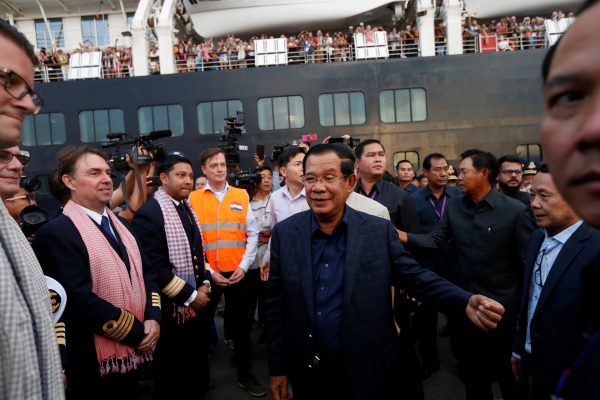Cambodia is a stalwart supporter of China, a country with which it enjoys strong economic and strategic relations. In contrast to other Southeast Asian states that want to balance security relations with the United States and economic ties with China, Cambodia is solidly in the China camp. Facing domestic political challenges and economic threats of sanctions by the likes of the European Union, economic and political engagement with China helps maintain Hun Sen’s grip on power and holds off the possibility of regime collapse.
Chinese economic investment enables the Cambodian Prime Minister to fund the patronage network that keeps him in power. This explains why Hun Sen travelled to China during the coronavirus outbreak and handled the cruise ship situation as he did. He predicted the Chinese government would not look kindly on countries that turned their backs on China by cutting off flights and contact during the coronavirus crisis.
On Valentine’s Day, Hun Sen greeted the disembarking MS Westerdam passengers with flowers and Cambodian scarves. The passengers were allowed to simply walk off the ship without any masks and go where they wished despite not having been properly medically screened. To demonstrate his lack of concern about the ship, Hun Sen did not wear a mask and his security forces had those wearing masks removed.
While the ship carried mostly Westerners, its association with the China-originated coronavirus is significant in this case. Hun Sen wanted to contrast Cambodia’s response with other Southeast Asian states that turned away the cruise ship. By welcoming it to dock in Cambodia, Hun Sen opted to show that he’s doing all he can during China’s time of need. This was to placate China, advance bilateral ties and safeguard the flow of economic investment.
Hun Sen stated that ‘evacuating [Cambodian students in Wuhan] would probably bring an end to opportunities for Cambodians to study there. China would stop offering scholarships’. This is a clear illustration of how he and the Cambodian government want to be viewed by Chinese President Xi Jinping as a staunch supporter of the Cambodia–China ‘friendship’ during this time of crisis.
The Chinese government has been pushing back on countries imposing travel bans on those coming from mainland China. In contrast, Hun Sen flew to Beijing — making him the first foreign leader to travel to China during this coronavirus outbreak. Instead of assisting Cambodian citizens in leaving China, Hun Sen wants them to stay and assist in combating the coronavirus.
While in China, Hun Sen stated ‘what is more terrible than the epidemic is the panic itself’. Flights are also continuing between China and Cambodia. Hun Sen’s visit and words of support have been warmly welcomed by the Chinese President — demonstrated by Xi’s announcement that ‘the Cambodian people stand with the Chinese people at this special moment’.
Hun Sen reportedly wanted to visit Wuhan to personally tell Cambodian students to remain there, further advancing Cambodia’s ties with China in his eyes. But the Chinese government turned down his request to drop in, with China’s Foreign Ministry spokesperson stating the city is too busy dealing with the outbreak situation.
Hun Sen’s handling of the docking of the MS Westerdam and the coronavirus crisis more broadly demonstrates his staunch alignment with China. The Cambodian government’s support for China stands in stark contrast to how other governments with relatively close ties with China, such as Russia and North Korea, have reacted to the situation. It implies that Hun Sen’s pro-China political and diplomatic positioning is set to continue on an upward soaring path.
Christopher Primiano is Assistant Professor at KIMEP University, Almaty.
Sovinda Po is a PhD candidate at the School of Government and International Relations, Griffith University.
This article is part of an EAF special feature series on the novel coronavirus crisis and its impact.


I have read your article and I totally agree with you that prime minister Hun Sen was standing with China in time of crisis. It is a good gesture as leader of a nation whose economy depends to a large extent on China investment. In addition, it is a gesture of gratitude toward friends when they are in trouble that we don’t walk away from them. On top of that, prime minister Hun Sen was confident that China will be able to eradicate the Covid-19 in a short period of time. It is undeniable that he supports China diplomacy over the Westerdam, but you forget to flesh out that he really did a humanitarian act as a leader. It was also part of his efforts to support human rights while those countries that boasted their human rights records failed to act even in such a grave situation. Imagine that if anyone of us was inside the ship, how would we feel when we heard that the ship were refused to dock and how would we feel when we finally heard that Cambodia will allow us to dock. You would feel as those travellers as did. I totally support the stance of prime minister Hun Sen in doing so since he was clear that there was no information that those travellers were Covid-19 positive. Further, what he did won loads of praise as a leader, and possibly will save Cambodia the GST in the coming future…He did it for Cambodia’s national interest.